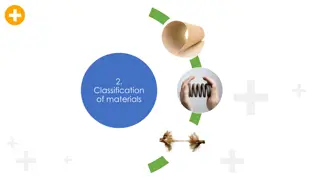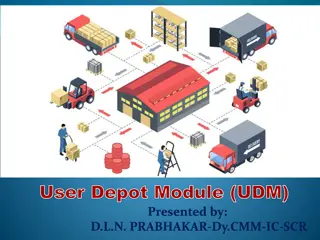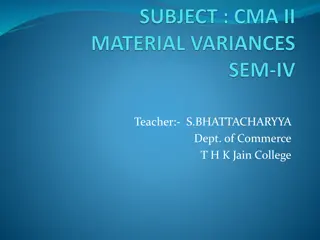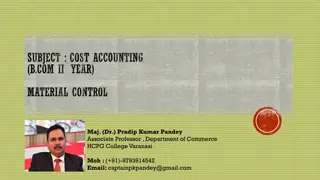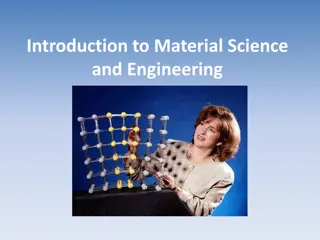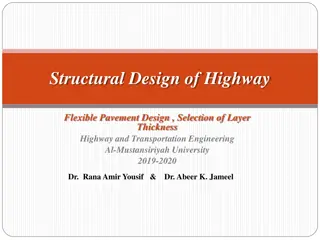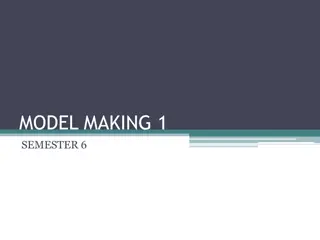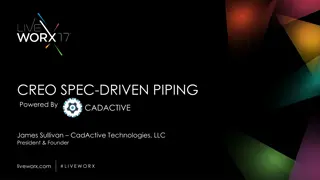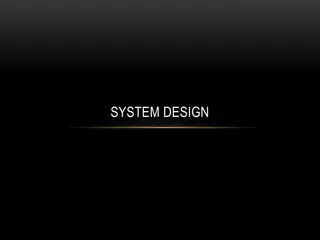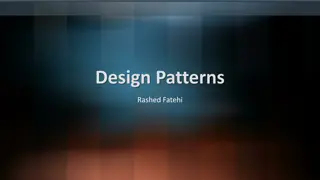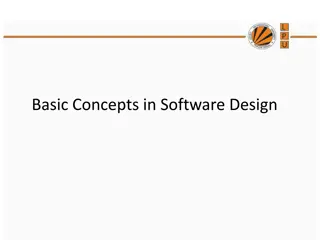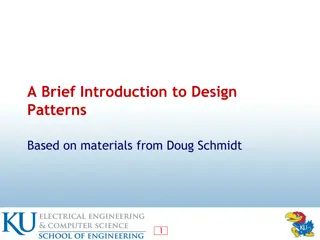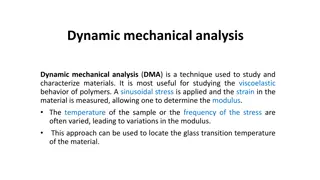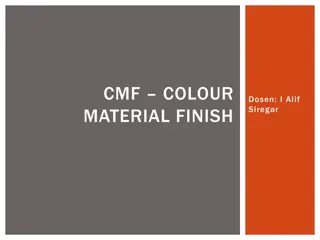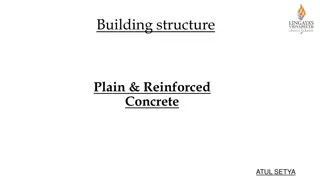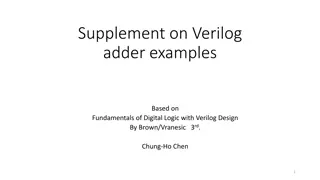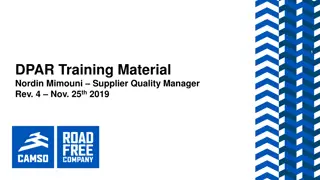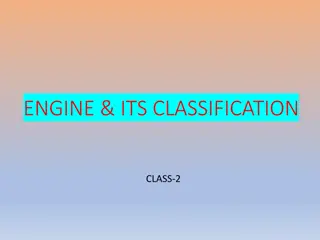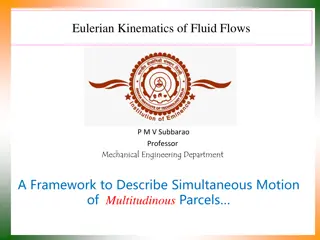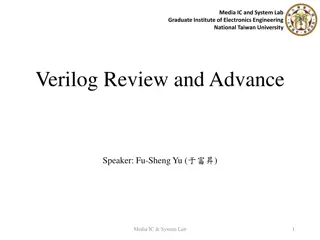Software Analysis and Design Process
Software analysis and design involve a systematic approach to understanding user requirements, creating logical models, and transitioning to detailed design specifications. Requirements analysis focuses on capturing system requirements, while design translates these requirements into implementation
8 views • 16 slides
Amended Convention on Physical Protection of Nuclear Material Tabling in Parliament
The Amended Convention on Physical Protection of Nuclear Material (CPPNM) is being tabled for acceptance and ratification in Parliament on 05 September 2023. The purpose is to enhance physical protection measures for nuclear material, especially in the face of increased security concerns post the 9/
3 views • 18 slides
Best study material for uceed
\"Best Study Material for UCEED\" by Sanyuktadesign provides comprehensive and targeted resources for aspiring design students. It includes practice tests, detailed explanations, and insightful tips to excel in the UCEED exam. This material is curated to enhance understanding and boost performance,
3 views • 1 slides
Material Classification in Product Design
Materials used in product design are categorized into papers and boards, metals, woods, polymers, composites, smart materials, and modern materials. Each classification has distinct properties and applications. Understanding these classifications is crucial for selecting the most suitable material f
3 views • 9 slides
Proposed Amendments for Hazardous Material Release Reporting Regulations
Amendments to the hazardous material release reporting regulations include consolidating definitions, adding new definitions, changing the administering agency, updating citations, and altering notification timeframes. The amendments aim to enhance emergency response and improve reporting procedures
3 views • 18 slides
User Depot Module (UDM) in Material Management
Genesis UDM was developed by CRIS to computerize material management at consignees' end, integrating with iMMS and IREPS. UDM revolutionizes the supply chain of materials management through digitalization, optimizing asset maintenance, expenditure control, and promoting a shift to digital working en
0 views • 19 slides
Guidelines for Design of Cement Concrete Pavement and Interlocking Paver Blocks
This document provides guidelines for designing cement concrete pavements and interlocking paver blocks, covering factors governing design, wheel loads, design period, subgrade characteristics, approximate k values based on CBR values, and the importance of a sub-base below concrete pavements. It em
1 views • 67 slides
Material Cost Variances in Commerce
Material cost variances play a crucial role in analyzing the differences between actual and standard costs of direct materials used in production. From material cost variances to material price, usage, and mix variances, each aspect sheds light on different aspects of cost control and efficiency in
0 views • 12 slides
Software Engineering Design Principles and Concepts
The chapter discusses the essential principles and concepts in software design, highlighting the four key design models - data design, architectural design, interface design, and component-level design. It emphasizes the importance of traceability to the analysis model, minimizing the gap between so
2 views • 36 slides
Material Control in Cost Accounting
Material control in cost accounting involves maintaining a systematic control over the purchasing, storing, and utilization of materials to minimize costs while ensuring uninterrupted production. It encompasses aspects such as accounting and operational controls, aiming to balance the efficient use
0 views • 9 slides
Comprehensive Overview of STAAD.Pro Structural Analysis and Design Software
STAAD.Pro is a powerful structural analysis and design software utilized by engineers for 3D model generation, analysis, and multi-material design. Developed by Research Engineers International and later acquired by Bentley Systems, it offers advanced user interface, visualization tools, and support
2 views • 26 slides
Strategies for Developing a National Nuclear Forensics Library
Nuclear forensics involves comparing data from unknown sources with known material characteristics to determine their origin. Establishing a national nuclear forensics library is crucial for identifying nuclear materials and promoting international cooperation in investigations. Key elements include
0 views • 18 slides
Implementation at Modane Grenoble - Summary of Copper Sphere Design and Fabrication Tests
This article provides an overview of the implementation at Modane Grenoble on June 11th, 2019, focusing on the design and fabrication tests of a copper sphere. It covers technical data, fabrication processes, material certificates, operation details, and installation status. The copper sphere featur
0 views • 20 slides
Material Science and Engineering Fundamentals
Delve into the world of material science and engineering to understand the core concepts, including the definition of materials, the role of material scientists, and the different types of materials such as metals, ceramics, polymers, and composites. Explore the length scales in material science, fr
0 views • 28 slides
Selection of Layer Thickness in Highway Flexible Pavement Design
Selection of layer thickness for highway flexible pavement design involves determining an initial pavement structure's design structural number and then choosing appropriate thicknesses to meet or exceed the required structural number. Cost-effectiveness, construction constraints, and maintenance co
0 views • 11 slides
Concrete Mix Design Submission Instructions
This document provides detailed instructions for submitting a new concrete mix design or upgrading an existing mix design. It covers requirements, options for mix design upgrades, material change considerations, and steps for selecting aggregate sources and materials. The document also includes guid
0 views • 27 slides
Model Making in Interior Design Education
Physical modeling plays a vital role in interior design by enabling designers and clients to visualize spatial relationships and constructive systems. Through careful material selection and basic tools, designers can create rapid paper models or detailed timber constructions to test design concepts
0 views • 12 slides
System on Chip (SoC) Design and Components
Explore the world of System on Chip (SoC) design, components, and working flow. Learn about Intellectual Properties (IP), platform-based design, typical design flows, top-down design approach, and the emerging Electronic System Level (ESL) design flow. Discover the essential components of an SoC, su
0 views • 45 slides
Design Inspiration and Elements in Costume and Fashion Design
Dive into the world of costume and fashion design through a visual journey of finding design inspiration, understanding the design process, emphasizing originality, and exploring different sources of creativity. Discover how technology, art, food, history, architecture, and nature can spark innovati
0 views • 45 slides
Enhancing Piping Design Efficiency with Spec-Driven Technology
Explore how Spec-Driven Piping technology powered by CADACTIVE offers a standardized approach for piping design in Creo Parametric. This innovative extension streamlines design communication, eliminates errors, and improves design efficiency by utilizing a master catalog, automated checking capabili
0 views • 15 slides
Material Design: Combining Classic Design Principles with Technological Innovation
Material Design is a design language that combines traditional design principles with the possibilities offered by technology and science. It emphasizes visual language, classic design elements, and innovation to create delightful user experiences. The Material Metaphor, Imagery, Typography, Color,
0 views • 34 slides
Comprehensive Guide to System Design Components and Techniques
System design involves the detailed planning and identification of components in an information system, aiming to provide users with a general understanding of the new system. This process includes techniques like flowcharts, prototyping, and component design, covering aspects such as output design,
0 views • 24 slides
Design Patterns: A Comprehensive Overview
Exploring the world of design patterns, this content delves into the essence of design patterns, their application in software design to resolve complexity, and the different types of design patterns - creational, structural, and behavioral. It also showcases examples of popular design patterns such
0 views • 22 slides
Basic Concepts in Software Design
Software design involves transforming customer requirements into a form suitable for implementation, with activities categorized into preliminary and detailed design stages. High-level design focuses on module identification and control relationships, while detailed design entails defining data stru
1 views • 24 slides
Evolution of Industrial Design: 1750-1945
Delve into the intriguing history of Industrial Design from 1750 to 1945, examining the collaboration between art and industry, mass production, changing consumption patterns, material advancements, and societal impacts. Discover the origins of Industrial Design, major design styles, and influential
0 views • 10 slides
3D Design and Critical Analysis in Architecture
Dive into the world of 3D design and critical analysis with a focus on architecture. Discover the stages of design, essential skills for designers, and areas of study in three-dimensional design. Delve into iconic buildings like Frank Lloyd Wright's Falling Water, analyze their key features, and eve
0 views • 9 slides
Design Patterns in Object-Oriented Design
Design patterns in object-oriented design (OOD) are essential templates that codify best practices for solving common problems. They help streamline development by capturing proven design decisions, promoting code reuse, and enhancing system flexibility and modularity. Learn about the core concepts,
0 views • 20 slides
Dynamic Mechanical Analysis (DMA) for Material Characterization
Dynamic Mechanical Analysis (DMA) is a valuable technique for studying viscoelastic behavior in materials, particularly polymers. By applying sinusoidal stress and measuring strain, DMA helps determine modulus and locate the glass transition temperature. The method involves varying temperature or st
0 views • 8 slides
Interaction Design in Human-Computer Interaction
Interaction design focuses on creating interactive products that are easy, effective, and enjoyable to use. It aims to reduce negative user experiences while enhancing positive ones. Designing interactive products requires understanding user activities, interfaces, and device arrangements to support
0 views • 11 slides
SE2811 Software Component Design Overview
This course covers software component design, design patterns, object-oriented design, algorithms, and opportunities for reuse in systems design. It emphasizes the importance of domain-level design and provides insights into solving core problems through reusable classes.
1 views • 21 slides
CMF in Industrial Design
CMF (Color, Material, Finish) in industrial design focuses on the visual, tactile, and decorative aspects of products. It involves specialized research, trend analysis, and creative thinking to develop unique color, material, and finish combinations. Experts like Reiko Morrison play a key role in sh
0 views • 7 slides
Analysis of Bunch Lengthening in CEPC for Different Design Parameters
This study explores bunch lengthening in the Circular Electron Positron Collider (CEPC) for various design parameters, analyzing a 54 km design scheme, a 61 km design scheme, and a 100 km design scheme. The analysis includes the theoretical framework used, equations for bunch lengthening, and conclu
1 views • 15 slides
Plain & Reinforced Concrete Structures in Design Engineering
In the design of Plain & Reinforced Concrete structures, various strength design methods such as Ultimate Strength Design (USD) and Allowable Strength Design (ASD) are utilized. These methods involve factors of safety, material strength, load factors, and analysis in the elastic range. Additionally,
0 views • 11 slides
Verilog Adder Examples & Typical IC Design Flow
This comprehensive content delves into Verilog adder examples, typical IC design flow, physical design considerations, and examples of OpenGL ES GPU and ARM hypervisor applications. It covers the fundamentals of digital logic with Verilog design, hardware description language, FPGA prototyping, phys
2 views • 27 slides
DPAR Training Material for Supplier Quality Managers
This training material covers the purpose, objectives, participants, and template of the Design, Process, and Assembly Review (DPAR) process for Suppliers. It explains the commitment needed from both Suppliers and Camso teams, target goals, participant requirements, and sections to be reviewed and f
0 views • 16 slides
The Importance of Software Design for Data Scientists
Today's ISEA Session 2 with David Beck from the University of Washington delves into the critical role of intentional software design for data scientists. The session covers the software design approach, user-centric design stories, use cases, components, testing strategies, and the benefits and dra
1 views • 76 slides
Engine Classification and Design
Engine classification involves categorizing engines based on various factors such as combustion type, number of strokes, cylinder design, and ignition method. Common classifications include external and internal combustion engines, as well as categories based on the design and use of the engine. Add
0 views • 11 slides
Material Derivative in Fluid Mechanics
Fluid flows are described using Eulerian kinematics and material derivative concepts, highlighting the changes in scalar and vector fields. The acceleration and components of material acceleration are explored, along with visualizations of material acceleration. Trajectories and displacements of flu
0 views • 13 slides
AI Optimization Tool for Efficient Architectural Design
Architects face challenges in material selection, cost balancing, and code compliance, leading to complex processes. Decision makers require improved workflows and decisions with more efficient design tools. Explore the design motivation, ideas, and optimization user interface for enhanced architect
0 views • 5 slides
Verilog Review and Advance Speaker: Fu-Sheng Yu - Media IC & System Lab
In the Media IC and System Lab at the Graduate Institute of Electronics Engineering, National Taiwan University, various topics related to Verilog, hardware design flow, RTL coding, gate-level design, and simulation are covered. The lab's focus includes circuit abstraction, synthesis, timing analysi
0 views • 39 slides



